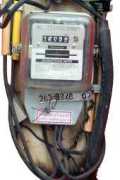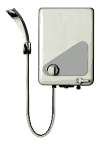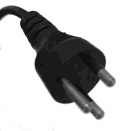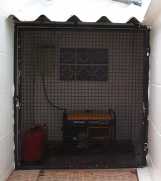 In Thailand, there are also regulations regarding proper electrical installation. Unfortunately many electricians are not well trained. Safety aspects only seem, at least in private home building, to play an inferior role. With regard to a safety relevant subject such as electrical installation, it is in your own interest to be particularly mistrusting and careful. In the following sentences, I cannot offer the training to become an electrician but would like to draw your attention to the most important aspects. You should never experiment yourself. The 230 volt mains voltage can be deadly. My tips should put amateurs into a position, where they can notice the gross errors in work performed by tradesmen. In order to be generally understood, I will try to avoid technical terms in the following information and use colloquial language instead. Experts should therefore forgive me that I use general terms such as „automatic circuit breaker“ instead of a circuit protection switch as an over current protection system.
In Thailand, there are also regulations regarding proper electrical installation. Unfortunately many electricians are not well trained. Safety aspects only seem, at least in private home building, to play an inferior role. With regard to a safety relevant subject such as electrical installation, it is in your own interest to be particularly mistrusting and careful. In the following sentences, I cannot offer the training to become an electrician but would like to draw your attention to the most important aspects. You should never experiment yourself. The 230 volt mains voltage can be deadly. My tips should put amateurs into a position, where they can notice the gross errors in work performed by tradesmen. In order to be generally understood, I will try to avoid technical terms in the following information and use colloquial language instead. Experts should therefore forgive me that I use general terms such as „automatic circuit breaker“ instead of a circuit protection switch as an over current protection system.Electric counter
Unlike in Europe, the electricity supply companies do not generally provide residential properties with an AC connection. You will therefore have to do with a single phase electrical connection (230 Volt). An electric counter with 10 (30) amps is usually installed. When applying for a connection to the electrics it is recommended that you demand a stronger counter with (45) amps. The limitation of power load should be considered when choosing electrical appliances:
● You do really need three water heaters?
● Can’t you supply more than one bath with one appliance?
● Do you really need an electric cooker?
● Or is a gas oven enough?
Unfortunately I have noticed that the cables/wires which are used in electrical counters are all the same colour. This means that it is not possible to tell the difference between the live and neutral wires. When installing the electrical counter, it is therefore pot-luck whether the connecting wires to the house are correct or mixed up. The conclusion is that the live wires might not be fed into the safety system but into a lead to a central clamp.

If you switch off the circuit breaker, in order to shut off the electricity through the cable, you are in danger because you might have only switched off the neutral wire without knowing. An electrician can easily test whether live and neutral wires are mixed up.
If necessary, a simple phase tester (screwdriver with lamp) is enough. When clamped onto the circuit breaker the lamp should glow. When installing lamps, you should also be careful, the phase is fed over the light switch. If not, there is the possibility that a fluorescent lamp glimmers lightly which can be quite annoying in a bedroom for example. This means that even when the lamp is switched off, there is still electricity running though it. In this case, the simple changing of a bulb can be dangerous even if the lamp is switched off.
Cable/safety cut out (circuit breaker)
The circuits are often over secured. If a mistake is made, this can lead to extreme burns. For the protection of plugs and lamps, wiring with a diameter of 1,5 mm² should be laid, which should then be with secured with a maximum of 16 amps. A three wire cabling is unfortunately rare. I recommend that you insist on an electrical circuit breaker with new installations. The cables which are required for this are available in Thailand in good electrical supplies stores. This is the only possibility to earth plugs and lamps.
If an electrical appliance with metal housing is earthed, any fault in the system will be found by the safety switch and shut off. This avoids people receiving electrical shocks from metal housing which has electricity running through it. Die The nominal current level of the circuit
Ampere

Laying cables in the earth
If you need to lay cables into the ground, you must pay attention to the use of suitable cables or installation pipes, as well as expert workmanship. As earth cables are very expensive, most people use standard cables and push them through an installation pipe and then bury the pipes. Unfortunately the electricians in Thailand tend not to fix the pipe connections. This leads to water entering the pipe and to the slow rotting of the cable. You should only use the recommended PVC pipes for installing pipes into the ground. The joints are slightly larger than the blue water pipes and therefore allow the cables to be pulled through easily. The grey pipes are completely unsuitable for ground cables and should only be used for installing cables on the wall.
RCD Device
In Europe, a residual current protective device (RCD) should now be regulation in all countries. This appliance can save lives and should not be missing from any electrical installation. Simply explained, this appliance works in that it compares the electricity flowing into the appliance with the electricity which flowing back. If it notices a difference, this means
 that electricity has escaped from the normal path. A person who, for example, receives a small electrical shock from a defective appliance, SAFE-T-CUT- would activate the RCD as fast SAFE-T-CUTas lightning. Appliances in Thailand are marked with similar properties to the SAFE-T-CUT. They can easily be built into an existing wiring installation. Unfortunately in lots of cases, as a result of improper or faulty cable installation and appliances, the SAFE-T-CUT immediately springs into action, meaning that all of the electrics are not operational. You should not resign, but take this as a reason to readjust the complete installation. Rotten cables or cables which were not laid correctly in the ground, or non-splash proof exterior lights are often the cause of problems. It is advisable that you run alarm systems and freezers through a circuit without the protection of a RCD, as a storm can lead to these appliances being switched off. If you are on holiday, your freezer food is in danger and your alarm system does not work.
that electricity has escaped from the normal path. A person who, for example, receives a small electrical shock from a defective appliance, SAFE-T-CUT- would activate the RCD as fast SAFE-T-CUTas lightning. Appliances in Thailand are marked with similar properties to the SAFE-T-CUT. They can easily be built into an existing wiring installation. Unfortunately in lots of cases, as a result of improper or faulty cable installation and appliances, the SAFE-T-CUT immediately springs into action, meaning that all of the electrics are not operational. You should not resign, but take this as a reason to readjust the complete installation. Rotten cables or cables which were not laid correctly in the ground, or non-splash proof exterior lights are often the cause of problems. It is advisable that you run alarm systems and freezers through a circuit without the protection of a RCD, as a storm can lead to these appliances being switched off. If you are on holiday, your freezer food is in danger and your alarm system does not work.Earth
Each and every electrical installation should be run over a central earth switch. In Europe steel strips are buried into the ground when the earth is dug out of the foundations. This flat piece of steel is then mounted centrally on a rail and laid onto the centre of the construction. In Thailand, this type of earthing system is unknown. In Thailand, an earth rod is which is available in electrical trade stores, is rammed into the ground (if at all). The connection clamps should be well protected against corrosion when the cable is connected. A central earth rod is very difficult to install afterwards. As a compromise, I would earth the most important hotspots. You should earth at least all large energy users (boiler, washing machine) as well as each appliance with metal housing (freezer, water dispenser, PC etc.).
In addition you can often drive an earth staff into the soil on each side of the exterior wall, and then lead a cable to the appropriate three pole plug socket.
Overhead protection
As the public electricity network in Thailand is generally made up of overhead cables attached to masts, they are often in danger of being struck by lightning. In addition, the frequency and the severity (at least during the rainy season) of stormy weather is becoming worse, just like what we are experiencing in Europe. To shut off all users if a storm is approaching, only represents protection at first sight. In practice, this is only an inept compromise. A storm can still affect your appliances even if the electricity flow is not there. Have you really unplugged all of the electrical appliances? It makes sense to use a surge resister. A good quality adaptor with a surge arrester from electrical trade stores will protect your valuable appliances. I cannot really trust cheap surge arresters from the supermarket. A large lightning strike would surely test the limits of the cheap adaptor. It will definitely be destroyed but with a little bit of luck, would hopefully protect your electrical appliances. In order to be protected against such incidents, there is a surge resistance scale. Behind the electrical counter is a strong surge arrester installed in the safety circuit, a medium surge resistance level and on the appliance itself, a light resistance of the said adaptor. You will need to speak with an electrician if an installation of this type is possible. A compromise solution is always better than doing without a surge resister all together. Our house is probably one of the few houses in our neighbourhood which has not suffered any lightning damage. I relate this to our lightning protection system, which is actually only a compromise solution. Please remember that lots of electrical appliances have further connections which bring the danger of a lightning strike closer. An computer is not only in danger with a lightning strike through the network cable, but also through the telephone connection which leads to the modem. Televisions are additionally in danger through the antennas.
Water heater
GLarge energy zappers such as boilers require a larger cable diameter. A cable with 6mm² and a backup with 32 amps is required for a boiler with 6000 watts delivery rate. However,
 you should follow the instructions given by the appliance supplier. Unfortunately, boilers from European supplier are also on Water heateroffer in trade stores, which work using single-phase alternating current as well as three phase current. The relevant contact bridges are to be laid inside the inner workings. Lots of electricians are asked too much of when it comes to interpreting wiring diagrams, due to a lack of training. As an amateur you will hardly be able to judge if this work has been correctly performed. You can get around this problem by only buying appliances which are only suitable for use for a single-phase alternating current (230 Volt).
you should follow the instructions given by the appliance supplier. Unfortunately, boilers from European supplier are also on Water heateroffer in trade stores, which work using single-phase alternating current as well as three phase current. The relevant contact bridges are to be laid inside the inner workings. Lots of electricians are asked too much of when it comes to interpreting wiring diagrams, due to a lack of training. As an amateur you will hardly be able to judge if this work has been correctly performed. You can get around this problem by only buying appliances which are only suitable for use for a single-phase alternating current (230 Volt).This information is only provided to help you judge the workmanship of the electrician and is not intended for you to try out anything yourself. In a neighbour’s house, I have seen an 8000 watt boiler with 4 mm² supply and 100 amps backup. My neighbour, who was not from the electrical branch, was not at all aware of the danger of fire. I hope that my notes help save you from any danger.
When it comes to heating up water, you must decide between different categories of appliances. Hot water tanks have a storage tank in which the water inside is constantly kept warm. They can usually be connected to a normal plug socket on an electrical boiler. I doubt if it is really economical to keep water heated up all day long due to the loss of energy through the thermal isolation.
Water boilers with which we are familiar with in Europe are installed using a direct connection to the hot water tap, in front of the warm water valve. In Thailand, there is another type which we do not know about in Europe. These boilers are less expensive and are installed directly into the shower cubicle inside a water valve. For safety reason, it is usually installed out of the way from the normal direction of water coming from the shower head. From an electrical safety point of view, I see this appliance as doubtful. For safety reasons, there should be no electrical appliances in the shower/bath area, no lamps, no sockets and not even a cable installed into the wall.
Door bell
The door bells in Thailand are supplied with 230 volts. You should therefore take care with door bells and have defect bells repaired by an electrician. The quality of the door bell contact should be high enough that your visitors are not in fear of their lives if they ring your door bell in the rain. A sticking door bell button which keeps sending 230 volts to the Gong can lead to danger of fire. The Gong is not designed for continuous use and therefore does not have any protection against over heating.
Plugs/plug sockets
The plugs which are used in Thailand have a deciding safety disadvantage in comparison to the standard European plugs. The pins of the contact protection plugs only make contact when the pins are hidden inside the socket. There is therefore no chance of touching the live pins when pulling the plug out or Plugs 230Vpushing it in. In Thailand, you should take extra care with reference to plug sockets. When feeling around in the dark for a plug socket,
 accidents can quickly occur. Small children's hands should be kept away from plug sockets as they are also in danger. The plugs in Thailand are supplied with three pins. The third pin has the same function as the contact protection plugs in European appliances. The Thais tend to have a nasty habit of simply cutting off the third pin in order to supply electricity to the appliance. This is gross negligence and should be avoided at all costs. As a result of this, even touching the housing of a computer can lead to an electric shock. When buying extension cables you should pay attention to the fact that a 3-pin cable connector is only effective if the plug on the extension cable is also 3-pin. This is unfortunately not the rule. Such extension cables are, however, available in electrical supplies stores.
accidents can quickly occur. Small children's hands should be kept away from plug sockets as they are also in danger. The plugs in Thailand are supplied with three pins. The third pin has the same function as the contact protection plugs in European appliances. The Thais tend to have a nasty habit of simply cutting off the third pin in order to supply electricity to the appliance. This is gross negligence and should be avoided at all costs. As a result of this, even touching the housing of a computer can lead to an electric shock. When buying extension cables you should pay attention to the fact that a 3-pin cable connector is only effective if the plug on the extension cable is also 3-pin. This is unfortunately not the rule. Such extension cables are, however, available in electrical supplies stores.Exterior lighting
Exterior lights should at least be splash proof. If this protection is a good quality, it should also stop insects from entering the lights. Please do not forget to seal up cable routes. Insects which manage to get into the lights do not only make the lights look unpleasantly dirty, but also get inside the bodies of any energy saving lamps. This leads to short circuits in the lamp's electronics and disturbs the function of the lamp.
Fluorescent tubes
Fluorescent tubes should be used in conjunction with electronic ballast. This reduces the energy use and increases the life span of the lamp considerably. These ballasts minimise any ugly flickering of the light when switching it on and the light can be ergonomically classed as flicker-free. As a result, this has a better effect on the eyes and can help reduce headaches.
Generator
In areas with frequent losses of electricity supply, the generator is a way of bridging these gaps in energy supply. The very cheap and simple generators which are often on offer are totally unsuitable for supplying energy to a house, as they do usually do not have a stable voltage control. These simple machines are designed for use with simple electrical tools, which are not so sensitive. In order to supply a house with energy the generator should have a good voltage control.
Generator voltage control:
-suitable for households-
● AVR = automatic voltage regulator
-not suitable for households as appliances can be damaged-
● Condenser = Simple voltage control
A generator with 2 KVA power will only be sufficient for powering the most important household appliances. Small air conditioning machines with only Generator8000 BTU can
 also be ran using the generator in an emergency. When turning on an appliance which needs a lot of power to start up (e.g. a pump) the running of the motor can start to stutter.
also be ran using the generator in an emergency. When turning on an appliance which needs a lot of power to start up (e.g. a pump) the running of the motor can start to stutter.Larger machines with 4 KVA power offer better reserves but are considerably more expensive. However, even these generators cannot supply large appliances such as a boiler. When turning on the generator, you should perhaps turn off large appliances beforehand. It would of course be even more ideal if the electrician separates the houses most important circuits and leads them to the switch/generator.
The generator should be placed in an area in which it has enough air to keep cool. This will be difficult to achieve in a room. A small overhanging roof in a suitable position with a lockable gate would be optimal. The increase in noise cannot be avoided. Bedrooms should be far enough away. When the generator is in use, you should remember to remove any petrol cans out of the area.
Alarm system
In a tropical country like Thailand, the use of movement detectors has the disadvantage that even a common gecko can cause a false alarm. Securing the windows, doors and cellar flap with contacts is less problematic and also has the advantage that if the alarm is switched on, the people inside the house can move around freely as long as they do not open any windows or the external doors. Unfortunately window contacts can be conquered by criminals in that they simply cut the glass out with a tool. The safer version, broken glass sensors, can rarely be mounted onto normal glass windows. Break ins through the roof by pushing back the roofing tiles should be secured through the use of a contact sensor on the loft hatch. The alarm box with light should be mounted in a position which can be well seen. It should not be underestimated as a deterrent for possible burglars
In this section, I have presented my own opinion. Amateurs should not try to take on electrical installation themselves. I do not accept any liability.
Categories
Land and house in Thailand
House building
≡ Menu
Data is provided without guarantee!
All information represents my own personal opinion.